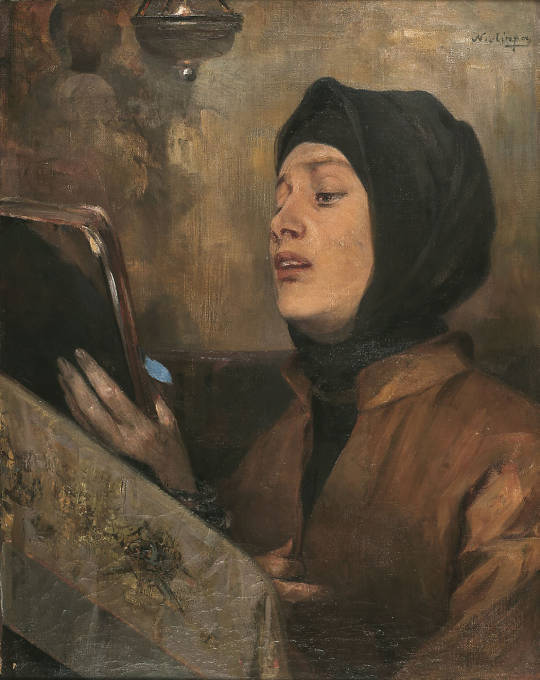#Nikephoros
Explore tagged Tumblr posts
Text

added him to my toyhouse finally ...
88 notes
·
View notes
Text
08 Works, Today, June 14th, is Saint Methodius I's day, his story in Paintings #165
Unknown artistMethodius I of ConstantinopleBulgarian icon St. Methodius I, also spelled Methodios, (born 788/800, Syracuse, Sicily — died June 14, 847, Constantinople)was patriarch of Constantinople from 843 to 847… Please follow link for full post

View On WordPress
#Ancient#Art#Biography#Fine Art#History#John Skylitzes#Leo#mythology#Nikephoros#Paintings#religion#Religious Art#St. Methodius I#Theodora#Theophilos#Zaidan
0 notes
Text
according to one chronicle, Nikephoros II Phokas, the warrior monk emperor of the tenth century, once asked the patriarch to recognize every dead Byzantine soldier as a Christian martyr. presumably this was because (in addition to his sincere overall faith) over his decades fighting Muslim armies, he realized how useful the concept of jihad was for boosting recruitment and morale, and wanted his own troops to have the same kind of inspiration.
the patriarch's answer was a firm "read the commandments and go fuck yourself," but Phokas wasn't wrong--holy war is a great social technology, including for Christians. he was just 150 years too early to see how powerful the idea really was.
42 notes
·
View notes
Text

Seal of Nikephoros Ill - The emperor Nikephoros Ill standing on a round dais and wearing a crown and a loros, an end of which is draped over the left wrist and decorated with four dots.
He holds a labarum in the right hand and a globu.
#Nikephoros #archaeology #history #ancient #art #archaeologist #ancienthistory #travel #archaeological #rome #italy #museum #roma #heritage #byzantinetoman#arthistory #archaeologylife #culture #antiquity #medallion #photography #Solidus #byzantinecoin #byzantinearcheology #byzantinecoins #الصديق_الصدوق
#history#archaeology#photography#culture#greek coins#travel#roman coins#palestrina#sidon saida tyre beirut phoenician الصديق_الصدوق#الصديق_الصدوق#Byzantine#Nikephoros Ill#seal
17 notes
·
View notes
Text




17 notes
·
View notes
Note
Theophano?
Hi! I'm not sure what you mean to ask, so I'm just going take it as an opportunity to talk about Theophano and her life.
Theophano was a Byzantine empress in the second half of the 10th century. She was the daughter-in-law of Constantine VII; wife of Romanos II and Nikephoros II Phokas; lover of John I Tzimiskes; and mother of Basil II and Constantine VIII.
She was famed for her extraordinary beauty, with chronicles hailing her as a "miracle of nature" who surpassed all other women of her age.
She was born to a family of reportedly low birth, with Skylitzes and Leo the Deacon both emphasizing her obscure origins. The former also claimed that Theophano's father was an innkeeper, and while we don't know if this is true or exaggerated, given the background of some former empresses (eg: Theodora), it's certainly plausible. We know next to nothing about her childhood, although she was probably close to her mother, who she may have brought to the palace and who was later exiled along with, although separately from, her daughter.
Theophano met Romanos, the heir of Emperor Constantine VII, as a teenager. The young prince seems to have become infatuated by her and decided to marry her in around 956, accordingly forcing a fait accompli on his family. It's possible that the imperial dynasty may have attempted to invent a noble lineage for Theophano to circumvent the controversy.
Theophano adopted her name after her marriage, having previously been known as Anastaso. She was trained in her duties as a member of the royal family, serving her apprenticeship as junior Augusta under the tutelage of her experienced mother-in-law Helena Lekapena. Both empresses were prominent in imperial ceremonies during Constantine’s reign, particularly during the reception of Olga of Kiev.
Romanos II came to the throne on November 959. At least one chronicle accused him and Theophano of conspiring together to poison her father-in-law Constantine and hasten their own ascent to power, although no evidence suggests that the former emperor died of poison or any kind of foul play.
During Romanos's very brief reign, he seems to have played little role in governance but instead entrusted administration to the eunuch Joseph Bringas. Most historians believe that Theophano was very influential during that time, with Romanos relying on her for advice and support. She certainly participated in political intrigue, supplanting the much more established and well-connected dowager empress, and successfully convinced Romanos to forcibly exile all his sisters to convents. This may suggest that she had less-then-cordial relations with her in-laws. More strikingly, it demonstrates that despite her youth and origins, Theophano succeeded in removing any other candidate of potential influence around Romanos, establishing herself as the dominant force at court. It's tempting to speculate what further role she might have played had her husband lived longer, but I suppose we’ll never know.
During their marriage, she and Romanos had four known children together: Helena, Basil, Constantine and Anna.
Romanos died prematurely in 963, after a short reign of less than three-and-a-half years. Theophano was once again rumored to have poisoned him, although this is extremely unlikely: as a favored and influential young empress, she had nothing to gain everything to lose from such an action. Moreover, she had given birth to her youngest child just a few days prior and was still in confinement, making it logistically improbable for her to have orchestrated such a conspiracy, with all the variables it entailed.
During her sons’ minority, Theophano was appointed as regent to the throne on the authority of the senate and patriarch. During that time, Skylitzes claimed that she was responsible for poisoning Stephen, son of Romanos Lekapenos, a possible contender for the throne who had been in exile and died suddenly on Easter Sunday. If this is true, it would have been a political act to secure her sons’ positions against possible threats, although the veracity of the accusation is unknown.
Unfortunately, Theophano’s regency was destined to be a short one. While one source asserted that she was capable of handling political affairs herself, and that she may not have wished to remarry, circumstances seemed to have forced/enabled her to choose otherwise.
At the time of Romanos's death, there was bad blood between Bringas, who remained administer of the empire, and Nikephoros Phokas, a renowned general of the army. The latter decided to seize the throne, probably due to the persuasion of his supporters rather than his own inclination. He was proclaimed Emperor by the army and was bound by an oath not to conspire against the rule of the young emperors. However, Bringas relentlessly plotted against him, attempting to deprive him of the position and offering the crown to someone else of his choosing.
During this factional struggle, Theophano decided to back Nikephoros, probably recognizing that the local and military support he possessed would be beneficial for her sons. She provided him with required legitimacy and was instrumental in his ascension to power: according to Zonaras, it was on her orders that he came to Constantipole to celebrate his triumph in April 963. Skylitzes even reports that they were lovers, and that Nikephoros desired the throne due to his infatuation with the beautiful young empress. Although it’s plausible the pair were in close communication with each other and may have decided to marry, an extra-marital actual affair is out of question given what we know of Nikephoros’s reticent and ascetical character. This was probably yet another way for chronicles to try and malign Theophano.
The situation was complicated by the fact that Nikephoros was godfather to one or both of Theophano’s sons, which would technically make the marriage uncanonical. In particular, the patriarch Polyeuktos was apparently very opposed to it. However, Nikephoros refused to be separated from Theophano, and the situation was resolved with the (probably invented) explanation that it was actually Nikephoros’s father, Bardas Phokas, who had been the young emperors’ godfather.
Theophano was a very influential empress during Nikephoros’s reign, with Leo the Deacon noting with disapproval that he “habitually granted Theophano more favours than were proper”. She was given profitable estates, was an active intercessor, and witnessed her two sons living in splendor and comfort in the palace. Considering what we know about her later life, she seems to have cultivated excellent relations with them.
However, relations between the imperial couple may have deteriorated, primarily from Theophano’s perspective, though chronicles aren’t unanimous on the details. Zonaros claimed that Nikephoros kept away from her due to his disinterest in sexual relations (though he appears to have still been devoted to her and honored her as an empress), while Skylitzes records that Theophano was the distancing partner. Some sources believed that Theophano may have grown concerned for the future and safety of her children, either at Nikephoros or his brother Leo’s hands.
All sources agree that Theophano and John Tzimiskes, the handsome and charismatic nephew of Nikephoros, became lovers in the late 1960s. Together, they conspired together to depose Nikephoros and place John on the throne, almost definitely with Theophano as empress. This was planned clandestinely in John’s home, and according to Leo the Deacon, Theophano received several warriors who she kept in a secret room near her quarters to enact the plan.
The Emperor’s assassination was eventually enacted on 10th December 969. Reportedly, Theophano pretended that she was heading out to instruct the Bulgarian princesses who had recently arrived as brides for her sons, and told Nikephoros to leave the bedchamber door open for her as she would close it when she returned. He did as she asked, making his customary devotions and falling asleep, which allowed the attackers to strike him unaware. John played a crucial role in the actual murder, striking Nikephoros on the head with his sword, though the coup de grace was delivered by one of the other conspirators, Leo Abalantes. While Theophano certainly played a vital role in the conspiracy, her direct participation in the murder itself is unknown. Later sources would dramatize her involvement: for example, Matthew of Edessa claimed that Theophano was the one who actually handed John the sword in order to carry out the murder.
Whatever her exact motivations, it’s clear that Theophano intended to orchestrate/support a new transfer of power just as she had with Nikephoros, becoming Empress for a third time. This was unprecedented across Byzantine history till that point, making her a singular figure.
However, things didn’t go as planned. John does seem to have intended to marry Theophano, and, after promising to ensure the safety and status of Romanos’ young sons as co-emperors, gained local support. However, when he went to St Sophia to be crowned, the patriarch refused him entry and presented him with three conditions: Theophano had to be banished from the palace and Constantinople, the murderer of Nikephoros had to be dealt with, and the measures taken against the church by Nikephoros had to be revoked. John, who keen to establish his own position and absolve himself from any blame, agreed or was forced to agree to these demands.
Theophano was thus sentenced to exile to the island of Prote or Prokonnesos. She didn’t accept her fate quietly: according to Skylitzes, she actually managed to escape from Prokonnesos and reappeared in the capital Constantipole, seeking refuge in the Hagia Sophia. However, she was forcibly removed by Basil the Nothos, who sent her to a newly created monastery of Damideia in distant Armenia. Before this, she was granted the request of an audience with the Emperor and her former lover John, which was not peaceful. Theophano reportedly “insulted first the emperor and then Basil [her son], calling him a Scythian and barbarian and hitting him on the jaw with her fists”. Her activities during her years-long exile are otherwise unknown.
After John’s death in January 1976, Theophano’s sons recalled their mother to the palace. She resumed her rightful position as empress, and since her elder son Basil never married, she would have remained the senior Augusta and most important imperial woman throughout her life.
Georgian sources indicate that Theophano also resumed her role as a prominent political figure, directing negotiations to broker an alliance with the Georgian overlord David of Taiq to counter a revolt by the general Bardas Skleros against her sons. She was also a generous patron and seems to have been partially responsible for supporting the foundation of the ‘Iviron’ monastery on Mt Athos reserved for monks of Georgian nationality.
However, Theophano vanishes from historical records after 978. It’s unknown if she died, retired, or if evidence for her activities has simply been lost across time.
All in all, Theophano seems to have been a fascinating woman who lived a full and sensational life. In many ways, she still remains a question mark, as very few primary sources survive to document the reigns of Romanos, Nikephoros, or the early years of her sons in detail. The majority of her daily activities, motivations, and even her ultimate fate, all remain unknown. But while this could have enhanced the effect of intrigue that already surrounds her, it seems to have had the opposite effect. Despite her controversial career, colourful romantic life, recorded influence over the court and affairs of state, and undeniable impact on the trajectory of the Byzantine Empire, Theophano remains a frustratingly unknown and often forgotten figure in most general histories of the dynasty.
She is also one of the most viciously maligned women in Byzantine history, vilified and scapegoated by contemporaries and historians as a wicked seductress, decadent intriguer, and violent murderess. Ultimately, we'll never know if Theophano was motivated by survival, desire, ambition, a combination of the above, or something else altogether. What we do know, however, is that she seems to have been a particularly strong-willed individual capable of navigating manifold realms of power despite not being born into it, and surviving the turbulent reigns of no less than six emperors. We can also appreciate how, in many ways, it was Theophano who seems to have gotten the last laugh: she outlived all her opponents and played a vital role in safeguarding the rights of her eldest son Basil II, who would go on to become the longest-ruling Roman Emperor.
In conclusion - she was fantastic and I love her.
References:
Lynda Garland, Byzantine Empresses: Women and Power in Byzantium, AD: 527-1204
Anthony Kaldellis, Streams of Gold, Rivers of Blood: The Rise and Fall of Byzantium, 955 A.D. to the First Crusade
John Ash, A Byzantine Journey
#ask#theophano#byzantine history#byzantine empire#women in history#my post#10th century#romanos ii#nikephoros ii phokas#basil ii#John I Tzimiskes#Byzantium#empress theophano
7 notes
·
View notes
Note
okay… and now who in town looks like they’re bound to do some BREEDING on someone?
Well hmm let me think, I know who'd id like to do some breeding on me thats for sure. I mean definitely Danilo, Hector, Eochaidh, and Enrique are the type to fuck you senseless until you passout, or maybe even call you a slur to seal the deal on how much youre just an item to them. But its the tame ones you have to look out for, maybe they're hiding something? Isn't that right Aiden, Arwyn, and Tristan. You seem very vanilla but deep down, your hiding a BEAST. Calliope knows all.

@werepackers @naturespelled @scalesandspclls @emunxz @allfangnostake @atlantianfell @fire-and-brimsdoughn
#wtnhgossip#tristian clairemont#aiden brenner#enrique munos#hector nikephoros#arwyn chevalier#danilo quijada#eochaidh mac dhurcain
7 notes
·
View notes
Text

Orthros by Nikiforos Lytras (1832-1904)
#greek#art#art history#τέχνη#ζωγράφος#painting#painter#19th century#Nikiforos Lytras#Nikephoros Lytras#Νικηφόρος Λύτρας#academic art#religious art#orthros#orthodox christianity
8 notes
·
View notes
Text




Staring at the pipeline of my two Hades /DnD OCs coming first with Nikephoros (Champion of Ares) and Telesilla (warlock of Nemesis) and then staring at Apoleia like "yeah, I should have seen this one coming-)
[Do not use/repost]
#DnD#Dungeons and Dragons#aasimar#genasi#earth genasi#barbarian#monk#warlock#rogue#OC: Nikephoros#OC: Telesilla#OC: Apoleia#My OCs#Truc Draws
22 notes
·
View notes
Text

wait what the hell going on
#doodles#oc#original character#nikephoros#and why tf cant i draw like this all the time huh. pissed awf
105 notes
·
View notes
Text

"Gather your nous and force it to enter into the heart and remain there. When your nous is established in the heart, it should not remain empty, but allow it to continually perform this prayer: Lord Jesus Christ, Son of God, have mercy on me. Never allow it to be silent. Because of this, the entire chain of virtues will enter into you: love, joy, peace, and all others, because of which your every petition to God will be fulfilled later."
~St. Nikephoros the Hesychast
#Orthodox Christian#saints#Hesychasm#nous#Jesus prayer#pray continually#mercy#St. Nikephoros#prayer of the heart#monastic#church
45 notes
·
View notes
Text



Anna Komnene and her husband Nikephoros Bryennios when things between them were easy
Art by Sato Futaba author of the historical mangas "Utae, Erinna!" and "Anna Komnene"
#byzantine#byzantine empire#middle ages#historical art#historical people#manga#Sato Futaba#Anna Komnene#Nikephoros Bryennios
3 notes
·
View notes
Text
Nikephoritzes gets a lot of shit but like, it’s 1071 and you’re in charge of the Byzantine Empire, you’ve just lost half your territory, legitimacy, and tax base, what would you have done?
#like Nikephoros I in creating perfectly reasonable reforms that were totally insensitive to public opinion and got him killed#…which makes him another addition to my byzantine nominative determinism list. huh.#byzantium
8 notes
·
View notes
Text
maybe i should leave an offering to the gods before my greek archeology test……
5 notes
·
View notes
Text

11 notes
·
View notes
Text

Drew my favorite character from @cnscomix Basil Basileus series! Finally finished Basil Basileus 3 over the weekend and was very glad to find that Nikephoros Ouranos survived 😭😭😭
What a man!
#nikephoros ouranos#basil basileus#byzantine tales#byzantium#byzantine empire#medieval history#byzantine history#history art#digital art#sketch#11th century#10th century#basil ii the bulgar slayer#fanart
4 notes
·
View notes